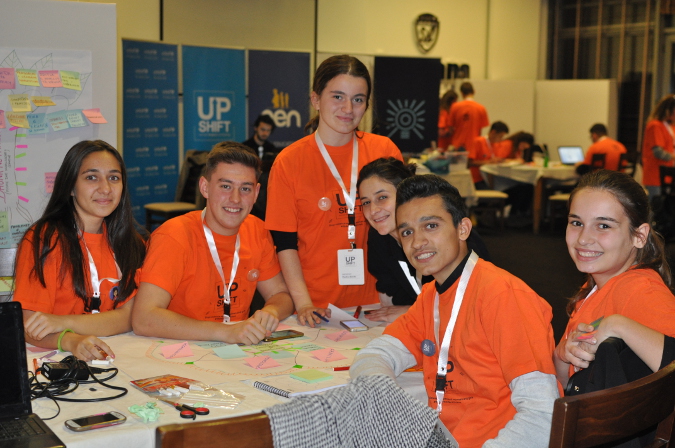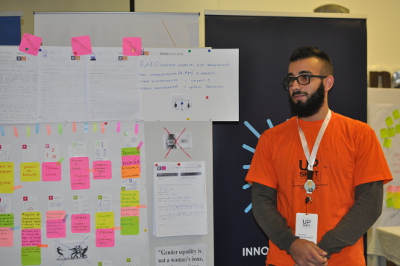Kosovo* youth use UPSHIFT to design gender equality solutions
At the UN Women-supported UPSHIFT Social Impact Workshop, young Kosovars learned the problem-solving and entrepreneurial skills necessary to design products or services to tackle gender equality challenges in their communities. Five practical projects generated from the workshop will receive funding and support to carry out their ideas in the coming months.Date:

On 4-6 November in Prishtina, Kosovo, 45 young adults from across Kosovo came together at the UPSHIFT Social Impact Workshop to hone their problem-solving and entrepreneurial skills and generate solutions to some of the most pressing gender-related problems facing their communities, some of which are poor and marginalized.
The UPSHIFT workshop is part of UNICEF Innovation’s Lab By Youth For Youth program, which empowers youth to build professional skills through mentorship and experiential learning. UN Women partnered with UNICEF for the 16 Days of Activism campaign in order to engage youth in Kosovo on the issue of gender-based violence.
Conducted in English, Albanian and Serbian, UPSHIFT generated product and service ideas to address gender equality challenges in targeted communities in Hani I Elezit, Prishtina, Gjakova, Suhareke, Gracanica, Vustrri and Shterpce. Designed by UNICEF Innovations Lab Kosovo and supported by UN Women as part of its work to foster gender equality in Kosovo, UPSHIFT used a set of modules to teach youth teams how turn an idea into reality.
Five of the ten teams participating won a chance to expand their ideas with practical projects that address sexual education in schools; sustainable safe houses for victims of domestic violence; gender equality educational programming; and sexism in the media.

The workshop includes activities and lessons that can be directly moulded and applied to each team’s interests and project. As one UPSHIFT participant remarked, “Previously, I have participated in similar workshops as UPSHIFT, but what I liked the most about UPSHIFT was that we were learning while working on our project, which was new for me and really helpful. We had time to work on our projects and also to have fun! Which was a great way of team building.”
The five winning UPSHIFT teams will receive up to 2,000 EUR, three months of mentorship and access to library and co-working spaces and equipment so they can carry out their initiatives as part of the UN Women in Kosovo Office’s 16 Days of Activism Against Gender-Based Violence campaign from 25 November-10 December.
The projects were evaluated for their relevance to the 2030 Sustainable Development Goals (SDGs). A main target of this year’s 16 Days of Activism campaign is fulfilling the 2030 Agenda for Sustainable Development, in particular, Goal 5 on Gender Equality and Goal 16 on Peace, Justice and Strong Institutions.
“It was very important to use the ‘16 days of Activism’ campaign to increase awareness and knowledge of youth about SDGs in general, and in particular, on Goal 5 and 16. Awareness and knowledge are both essential for ownership- ownership of the goals by everyone. In the end, ending all forms of discrimination against women and girls is not only a basic human right, but it is also crucial to accelerating sustainable development.” says Flora Macula, Head of UN Women in Kosovo.
Conflict and crises have devastating consequences and often exacerbate gender inequality between women and men. The UPSHIFT projects tried to address gender equality challenges that Kosovo, still undergoing post-conflict transformation years after hostilities ceased in 1999, continues to face.
Some projects used education and information to design products to help young women and men build equitable futures. Identifying a lack of sexual education in their school, one team came up with a plan for a phone app that would use blogs and informatics on anatomy, sex, contraceptives and consent to provide young people with sex and gender information.
Another team developed a gender-neutral career counselling program, where young students could join internships and apprenticeships, regardless of their gender and the job’s gender-stereotype.
Other teams addressed intergenerational cycles of violence and poverty. To improve opportunities for survivors of domestic violence living in safe houses, one group developed a program to bring NGOs together to train women in skills and boost their economic independence by connecting them to local markets.
Recognizing the cycle of poverty created when vulnerable women and girls are cut off from educational and employment opportunities, another team crafted an educational program that sought to break that cycle by using their schools and teachers to spread job and skills training information to young girls.
* All references to Kosovo in this story shall be understood in full compliance with UN Security Council Resolution 1244 (1999)